How VitalTrak Combines Lab Work with Nutritional Counseling

Transforming Health Management with Innovation
VitalTrak exemplifies the future of personalized health care by integrating sophisticated lab diagnostics directly into nutritional counseling. This comprehensive approach not only elevates the accuracy of health assessments but also ensures tailored interventions that align with individual biological profiles, making health optimization more precise and accessible.
Overview of VitalTrak’s Integrated Health Model
What features and operational approaches characterize VitalTrak’s integrated health services?
VitalTrak’s approach to health management integrates cutting-edge sensor technology with personalized health assessments to deliver comprehensive care. The core of their system is the VitalSense™ sensor, a medical-grade device designed for secure and precise health monitoring at home. This technology offers hospital-level accuracy without the need for calibration, making it highly reliable and user-friendly.
The platform combines lab testing insights—such as lipid profiles or micronutrient levels—with direct data collection from the VitalSense™ sensors. This synergy allows for highly personalized health coaching, tailored to the individual's unique needs and progress. The system tracks various health metrics continuously, including heart rate, oxygen saturation, and other vital signs, enabling users and practitioners to identify patterns and respond proactively.
Operational features further enhance usability. The devices support trend tracking, where changes in health metrics are visually represented over time, making it easier to see the impact of lifestyle modifications like diet or exercise. Dual-user memory functions accommodate multiple users in the same household, while one-touch operation simplifies the user experience.
Designed for practicality, VitalTrak devices are built to high standards, with pre-calibrated sensors, durable construction, and high-quality materials such as adjustable cuffs for a secure fit. This combination of sophisticated technology and straightforward design ensures that users can reliably monitor their health status anytime, anywhere.
This integrated approach—merging lab data, sensor-based tracking, and personalized coaching—positions VitalTrak’s services as a robust solution for individuals seeking proactive health management. They emphasize not only accuracy and ease of use but also the importance of comprehensive, data-driven health insights.
Use of advanced sensor technology
VitalSense™ represents the forefront of home health sensor technology. It provides real-time, hospital-grade readings directly from the comfort of home, dramatically reducing the need for frequent clinical visits solely for monitoring purposes. Its non-calibrated, high-precision readings include vital parameters such as blood pressure, oxygen saturation, and heart rate variability.
The sensor’s design emphasizes durability, with a focus on seamless integration into daily routines. Its high-quality construction supports consistent performance, even over long periods of use. The device’s compact size and easy operation make it accessible to people of all ages, extending the benefits of advanced healthcare directly into personal spaces.
Overall, VitalSense™ exemplifies the potential of combining innovative sensor technology with integrated health services. Its role is to empower individuals with accurate, actionable data, helping them make informed decisions about their health while facilitating ongoing communication with healthcare professionals.
The Critical Role of Lab Testing in Personalized Nutrition
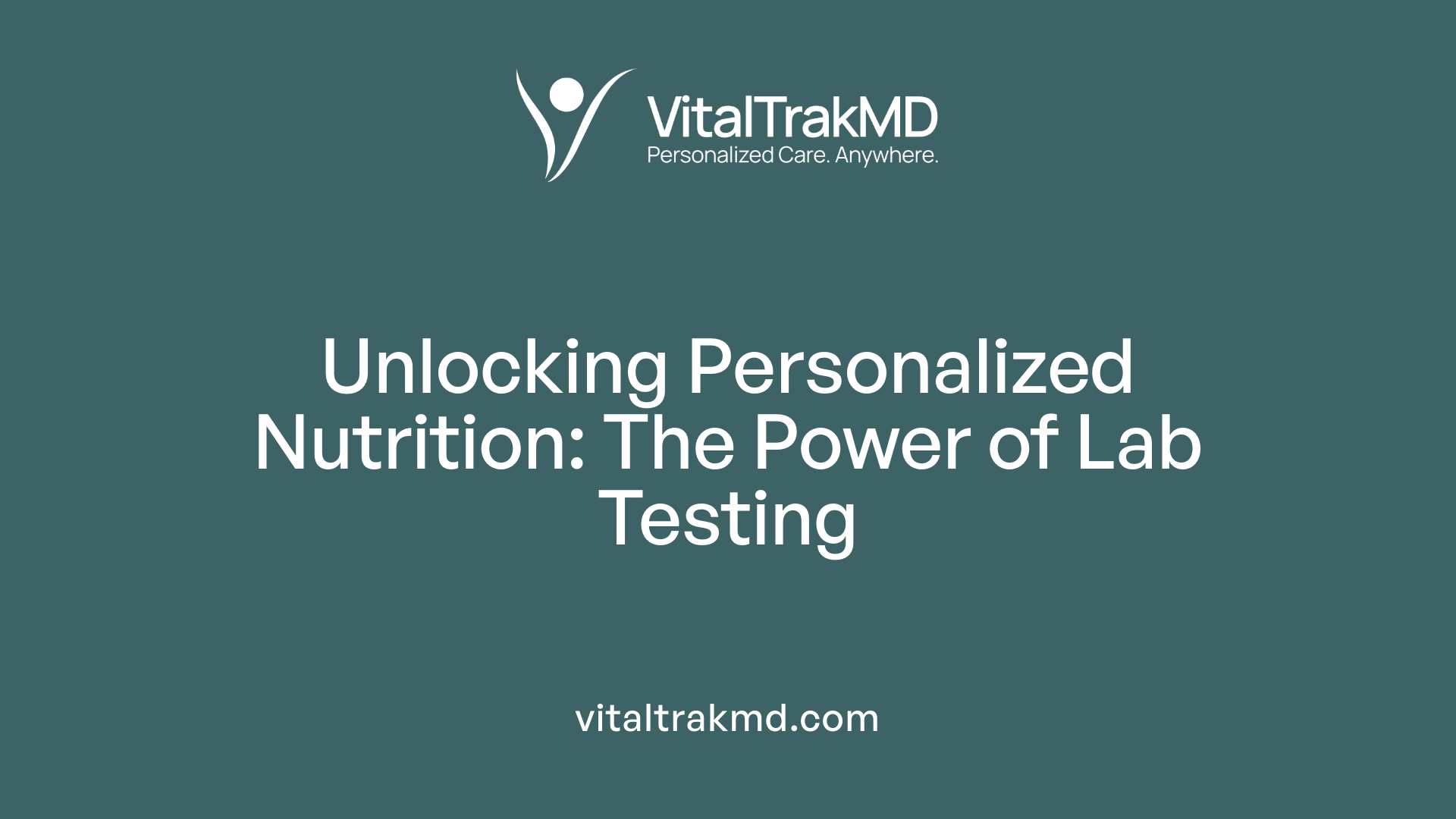
What are the benefits and methodology of combining laboratory testing with nutritional guidance?
Laboratory testing plays a vital role in crafting personalized nutrition strategies because it provides objective, detailed insights into an individual's health status. Unlike food journals or symptom tracking, lab assessments can accurately measure nutrient levels, metabolic functions, and physiological imbalances.
By analyzing samples such as blood, urine, or saliva, healthcare providers identify deficiencies that might not be apparent through symptoms alone. This data helps in designing tailored dietary plans and supplement protocols that directly address specific needs.
Furthermore, these tests enable ongoing monitoring of progress, ensuring that nutritional interventions are effective and sustainable. The integration of lab results with guidance creates a data-driven foundation that boosts client motivation, as they can see tangible improvements over time.
This scientific approach supports precise health management, resulting in better outcomes and more personalized care. It empowers clients to understand their bodies better and make informed decisions about their nutrition and lifestyle.
How can lab testing reveal issues like food sensitivities or hormonal imbalances?
Lab testing extends beyond nutrient levels to uncover hidden factors affecting health. For example, food sensitivity tests can analyze immune responses to specific foods, helping identify triggers that may cause inflammation or discomfort.
Gut health assessments, such as microbiome analysis, reveal the balance of beneficial and harmful bacteria in the digestive system. This information guides interventions to improve gut function, which is essential for overall health.
Hormonal tests measure levels of hormones like estrogen, progesterone, cortisol, and thyroid hormones. Imbalances here can influence energy, mood, weight, and metabolic health.
Additionally, labs can explore metabolic markers, inflammation levels, and other physiological factors. These insights allow practitioners to craft targeted plans that support hormonal harmony, digestive health, and immune function.
Incorporating such testing into nutritional counseling ensures a comprehensive understanding of health intricacies, enabling precise interventions and improved symptom management.
Benefits of lab diagnostics in personalized nutrition plans
| Aspect | Explanation | Additional Details |
|---|---|---|
| Nutrient Gaps | Identifies deficiencies or excesses | Guides supplement and diet adjustments |
| Functional Ranges | Detects early imbalances before clinical symptoms | Supports preventive health |
| Personalized Interventions | Tailors plans based on real physiological data | Enhances effectiveness |
| Monitoring | Tracks changes over time | Measures response to interventions |
| Early Detection | Finds issues before they develop into serious conditions | Enables timely action |
Lab testing, especially when integrated with clinical insights, elevates nutritional guidance by making it precise and responsive. Employing functional ranges rather than conventional ones often uncovers subtle imbalances, allowing for proactive health maintenance.
Incorporating laboratory diagnostics into nutrition planning is thus essential for delivering individualized, effective, and preventative healthcare strategies. With advancements in labs offering quick, accurate, and comprehensive testing, personalized nutrition is becoming more accessible and impactful for everyone seeking to optimize their health.
Integrating Diagnostics with Personalized Nutrition Health Strategies
What is the process behind linking lab diagnostics with nutrition counseling in health services?
Connecting lab diagnostics with individualized nutrition care involves a structured and systematic approach known as the Nutrition Care Process (NCP). This process begins with a comprehensive Nutrition Assessment, where various data sources are utilized to gather detailed health information.
During the assessment phase, biochemical data, such as blood lipid profiles, nutrient levels, glucose markers, and other relevant tests, are collected alongside medical histories and lifestyle factors. These lab results provide critical insights into specific nutrient deficiencies, imbalances, or health conditions that might not be apparent through symptom tracking alone.
Once sufficient data is gathered, a registered dietitian formulates a Nutrition Diagnosis that identifies precise nutrition problems—such as elevated cholesterol levels, insulin resistance, or mineral deficiencies—based on lab findings.
With these identified issues, targeted nutrition interventions are developed. These plans are personalized, aiming to correct deficiencies, balance metabolism, and support overall wellness. For example, elevated LDL cholesterol might lead to a dietary plan rich in heart-healthy fats and fiber, complemented by lifestyle modifications.
Crucially, this process incorporates ongoing Monitoring and Evaluation. Regular lab testing and assessments help track the progress of interventions, guiding necessary adjustments. Real-time lab data can verify improvements or reveal new issues, enabling responsive care.
This integrated approach ensures that lab diagnostics are not isolated data points but essential tools that directly influence personalized nutrition strategies. It supports clinicians in making evidence-based decisions tailored to individual health needs, leading to better outcomes.
In practice, platforms like Fullscript facilitate the ordering of relevant tests such as micronutrient panels, metabolic panels, or gut health tests, simplifying the integration process. Ultimately, linking lab results with nutrition care fosters a comprehensive, precise, and effective pathway towards improved health for each person.
How Lab Data Translates into Personalized Nutrition Plans
How do lab results contribute to tailored diet strategies?
Lab testing offers detailed insights into an individual’s nutrient levels, metabolic processes, and overall health status that go far beyond food journals and symptom tracking. By analyzing biochemical markers such as lipid profiles, vitamin and mineral levels, and hormone statuses, healthcare professionals can identify specific nutrient gaps or imbalances.
This precise data forms the foundation for creating personalized nutrition plans. For example, if lab results show low vitamin D or elevated cholesterol, targeted dietary adjustments or supplementation can be recommended to address these issues effectively. The goal is to optimize health by aligning dietary intake with an individual’s unique biological needs.
Interpreting genetic and biochemical data for nutrition planning
Genetic tests provide information about how a person metabolizes different nutrients. For instance, variations in genes related to fat absorption or carbohydrate processing can influence what dietary approach is most suitable.
Biochemical data from lab tests complement this genetic information, offering real-time insights into current nutrient statuses and metabolic functions. This combined understanding helps nutritionists develop strategies that are both preventive and corrective, ensuring the individual maintains optimal levels of essential nutrients.
How do professionals adjust nutrition based on lab findings?
Based on lab results, nutrition plans are tailored to target identified deficiencies, hormonal imbalances, or metabolic inefficiencies. For example, if a person exhibits elevated triglycerides and low omega-3 levels, dietary recommendations may include increasing fish consumption and supplementing with omega-3 fatty acids.
Regular testing also allows for monitoring progress. As biomarkers improve, nutrition plans can be adjusted accordingly to sustain health benefits. This dynamic, evidence-based approach ensures interventions are relevant and impactful.
Standard tools and methods for implementing lab-driven nutrition plans
A range of lab tests is available for comprehensive assessment, including:
| Test Type | Purpose | Detail |
|---|---|---|
| Micronutrient Panels | Detect deficiencies or excesses of vitamins and minerals | Guides supplementation and diet modifications |
| Lipid Profiles | Measure cholesterol and triglycerides | Informs cardiovascular risk management |
| Blood Glucose and HbA1c | Screen for insulin sensitivity and diabetes risk | Supports metabolic health strategies |
| Gut Health Tests | Assess microbiota and digestive function | Tailors probiotic, prebiotic, and dietary adjustments |
| Hormonal Panels | Evaluate thyroid, adrenal, and reproductive hormones | Assists in balancing hormones affecting nutrition and metabolism |
Order and interpretation of these tests should be done through reputable labs or platforms like Fullscript, which simplifies access to diverse testing options. Over time, tracking lab results helps refine and personalize nutritional guidance further.
The role of nutrition professionals in utilizing lab data
Healthcare providers, especially registered dietitians and nutritional counselors, interpret lab data within the broader context of their clients’ symptoms and lifestyles. This integrated understanding ensures that the nutritional recommendations are holistic.
Additional training can sharpen their ability to read and apply complex lab results. This skill enhances the precision of dietary advice and boosts health outcomes.
The significance of functional ranges and lab testing accuracy
Many labs now use functional ranges, which are often more sensitive than conventional ranges, allowing earlier detection of nutritional imbalances. Accurate interpretation of these results, paired with a thorough understanding of the person’s lifestyle, can lead to proactive health management rather than reactive treatment.
Lab testing is best used as a supplement—rather than a substitute—for comprehensive assessment methods, including diet history and physical exams. When combined, these tools offer a robust approach to personalized nutrition planning.
How integration with wearable technology complements lab-based insights
Modern wearables monitor physiological signals such as Heart Rate Variability (HRV), respiration rate, and galvanic skin response. Data from these devices can identify stress levels and patterns that influence nutritional needs, stress management, and overall wellness.
While lab testing provides biochemical snapshots, wearables offer continuous real-time information. Combining these data sources enables a holistic approach to tailored health interventions, optimizing both nutritional and mental health strategies.
The Science Behind Personalized Nutrition from Scientific Testing
How does genetic testing and gene–diet interactions influence personalized nutrition?
Genetic testing offers valuable insights into how our genes impact nutrient absorption, metabolism, and overall health responses to different diets. By analyzing specific genetic markers, health professionals can identify predispositions to nutrient deficiencies, food sensitivities, and conditions like lactose intolerance or celiac disease.
Gene–diet interactions are complex, but understanding them allows for tailored dietary plans that optimize health outcomes. For example, someone with a genetic variation affecting folate metabolism may need higher intake or specific forms of folate. This knowledge helps craft more precise recommendations that align with individual genetic profiles.
Advanced genetic testing technologies, such as next-generation sequencing, facilitate detailed examination of thousands of gene variants quickly and accurately.
What role does microbiome and phenotypic data play in personalized nutrition?
The microbiome—the community of trillions of microbes living in our gut—significantly influences digestion, immune function, and nutrient synthesis. Analyzing microbiome composition helps identify imbalances or dysbiosis that may contribute to inflammation, metabolic issues, or food intolerances.
Phenotypic data, including blood levels of nutrients, metabolic markers, and physical health indicators, provide context for the microbiome and genetic results. Combining microbiome analysis with phenotypic data enables a holistic view of individual health status.
This integrated approach allows practitioners to design interventions that restore microbial balance, improve digestion, and correct nutrient deficiencies, creating a comprehensive strategy for health optimization.
How do evidence-based recommendations emerge from scientific testing?
Scientific testing grounds personalized nutrition in validated data and rigorous scientific research. With testing results, healthcare providers can base advice on concrete evidence rather than assumptions or general guidelines.
For example, lab results like lipid profiles, micronutrient panels, or hormone levels can pinpoint deficiencies or imbalances. When combined with genetic and microbiome data, these insights inform targeted interventions with a higher chance of success.
Ongoing research, including randomized controlled trials and meta-analyses, ensures that recommendations remain current and scientifically sound. This evidence-based framework encourages trust and efficacy in personalized nutrition plans.
| Testing Type | Key Insights | How It Enhances Nutrition Guidance |
|---|---|---|
| Genetic Testing | Gene–diet interactions | Customizes diet based on genetic predispositions |
| Microbiome Analysis | Microbial composition | Guides probiotic and dietary interventions |
| Phenotypic Data | Blood and metabolic markers | Validates nutrient needs and health status |
The integration of testing and personalized advice in practice
VitalTrak exemplifies how scientific testing enhances personalized nutrition. By analyzing genetic, microbiome, and phenotypic data, VitalTrak develops tailored dietary recommendations backed by the latest scientific evidence.
These insights enable individuals to make informed dietary choices, improve health outcomes, and prevent disease. Furthermore, continuous monitoring via lab tests and wearable devices helps track progress, making adjustments as needed.
In summary, scientific testing—through genetics, microbiome, and biochemical analysis—provides the foundation for precise, evidence-based nutrition advice. As research advances, personalized recommendations become increasingly effective and trustworthy, paving the way for more individualized health management strategies.
Bridging Lab Work with Expert Nutritional Counseling
How does VitalTrak combine lab work with nutritional counseling?
VitalTrak effectively integrates lab testing with nutrition guidance to create personalized health plans. It leverages advanced diagnostic tools and professional platforms to gather detailed insights into an individual’s nutrient status, hormonal balance, gut health, and other critical factors.
One of the main methods used is through partnerships with reputable labs accessible via platforms like Fullscript. Nutritional counselors can order targeted tests such as micronutrient panels, metabolic assessments, and gut health evaluations. These results are then reviewed within the system, allowing counselors to understand specific deficiencies or imbalances.
Once the lab data is obtained, it can be used to craft tailored dietary and lifestyle recommendations. For example, if a deficiency in vitamin D or an imbalance in gut flora is detected, the nutrition plan can be adjusted to address these issues directly.
In addition to traditional lab work, emerging rapid diagnostic tools like the VitalOne device are changing the landscape. These point-of-care tests can provide immediate blood analysis, accelerating the process of translating lab diagnostics into actionable nutrition strategies.
The integration of lab results into counseling sessions enhances the precision of interventions. It allows practitioners to move beyond symptom-based advice and base their guidance on measurable, objective data.
Ultimately, VitalTrak bridges cutting-edge science with expert guidance, empowering individuals with personalized, evidence-based approaches to health optimization.
Use of Rapid Diagnostic Tools for Instant Results
Rapid testing devices are revolutionizing how nutritional data is gathered and interpreted. These portable, easy-to-use tools can deliver immediate insights, facilitating prompt adjustments to health plans.
The VitalOne device, for example, allows for quick blood sample analysis without the need for traditional lab visits. The results can be used on the spot to tailor dietary recommendations, supplement protocols, or lifestyle modifications.
Such instant diagnostics are particularly useful in cases where timely intervention is crucial. They also improve client engagement by providing real-time feedback and fostering motivation.
Personalized Strategies Based on Lab Data
Personalized health strategies are now more attainable thanks to detailed lab diagnostics. Nutritional counselors can identify particular nutrient deficiencies, hormonal imbalances, or gut health issues that are unique to each individual.
This personalized approach ensures interventions are targeted and more effective. For example, addressing a selenium deficiency with specific dietary changes or supplements, or correcting hormonal imbalances through tailored diet and lifestyle modifications.
By combining lab work and expert advice, practitioners can monitor progress over time, making adjustments based on follow-up testing results. This ongoing process supports long-term health improvements.
| Aspect | Description | Additional Details |
|---|---|---|
| Lab Partnerships | Reputable labs for detailed testing | Micronutrient, hormonal, gut microbiome panels |
| Rapid Tests | On-the-spot diagnostics | VitalOne, other portable devices |
| Data Integration | Custom nutritional plans | Based on lab insights, progress tracking |
| Technology | Instant results for faster adjustments | Real-time feedback, digital dashboards |
This synergy between science and personalized care exemplifies how modern nutritional counseling is evolving to meet individual needs efficiently and accurately.
The Future of Personalized Health Monitoring and Nutrition
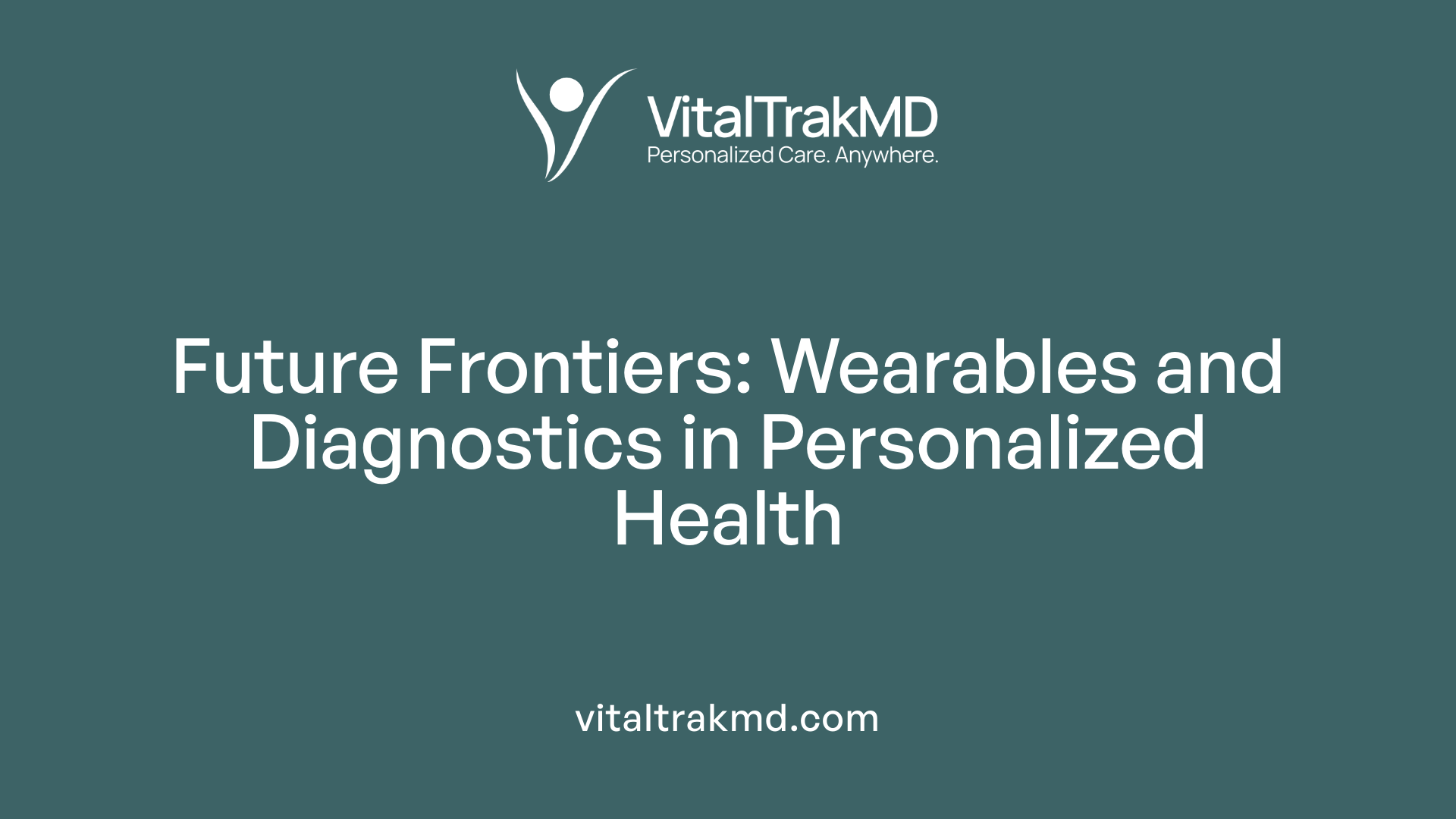
How do wearable devices contribute to health monitoring?
Wearable devices are transforming how individuals track and manage their health. These gadgets, which include popular products like the Apple Watch, Empatica E4, and custom-made devices, monitor physiological signals such as Heart Rate Variability (HRV), Heart Rate (HR), galvanic skin response, respiration rate, EEG, and oxygen saturation.
By continuously collecting data, wearables offer real-time feedback during stress episodes. This helps users recognize patterns and triggers that affect their health, promoting self-awareness and early intervention.
What emerging health technologies are shaping the future?
Advancements in health technology include lab-quality point-of-care tests from companies like VitaMe Technologies, Inc., which analyze key nutrition markers from a small blood sample. These results, paired with personalized advice, support better dietary decisions and health outcomes.
Additionally, improvements in home monitoring devices for conditions like hypertension, such as validated blood-pressure monitors like the Omron Platinum BP5450, allow individuals to track their blood pressure accurately over time. Data sharing features enable seamless communication between patients and healthcare providers.
This integration of lab testing with home devices and wearables enhances personalized care, early detection of imbalances, and ongoing health management.
How do self-regulation and prevention techniques incorporate these technologies?
Self-regulation strategies increasingly leverage wearable tech to promote mental and physical resilience. Real-time feedback from wearable sensors facilitates techniques such as guided breathing exercises, virtual reality environments, and horticultural therapy, helping individuals manage stress effectively.
Visual dashboards and trend visualizations provide ongoing awareness of stress patterns, encouraging proactive behavior and prevention. These tools are especially useful in long-term therapy and in enhancing understanding of individual health responses.
Studies indicate that these interventions not only reduce stress but also improve individuals’ confidence in managing their health. Although many results come from controlled settings, the positive impact suggests broad potential for widespread use.
| Technology Type | Examples | Main Uses | Benefits |
|---|---|---|---|
| Wearable Stress Monitors | Apple Watch, Empatica E4 | Detect stress via physiological signals | Real-time feedback, stress awareness, self-regulation |
| Lab-Quality Point-of-Care Tests | VitaMe Technologies' tests | Analyze nutrition markers | Personalized dietary advice, health improvements |
| Home Monitors | Omron BP5450 | Track blood pressure regularly | Consistent readings, data sharing, health trend tracking |
| Self-Regulation Devices | Virtual reality tools, guided breathing apps | Stress management and relaxation techniques | Enhanced self-control, reduced stress levels |
Understanding the interplay between advanced lab testing, wearable technology, and self-regulation strategies is shaping a future where personalized health management becomes more accessible and effective.
Enhancing Client Outcomes with Laboratory and Wearable Data
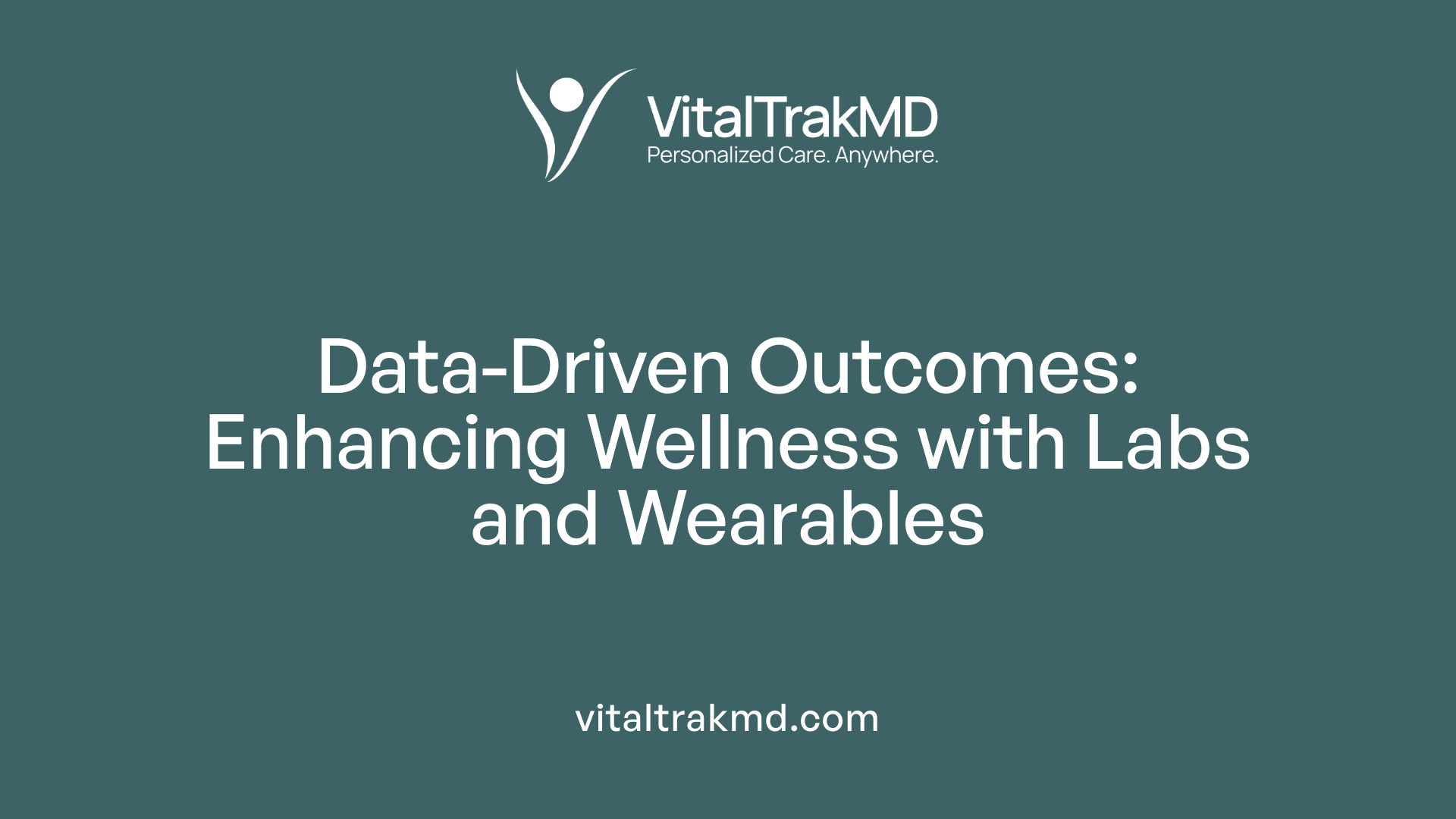
How does lab testing improve our understanding of overall health?
Lab testing offers invaluable insights into various aspects of health that food journals or symptom-tracking alone cannot provide. By analyzing nutrient levels, digestion efficiency, and metabolic function, labs reveal underlying deficiencies and imbalances. This comprehensive data helps build a clearer picture of what may be affecting a person's wellness and guides personalized nutrition strategies.
What kind of information can lab results uncover?
Lab tests can identify nutrient gaps, such as deficiencies or excesses, and examine hormonal balances, gut health, and food sensitivities. These insights assist health professionals in creating targeted interventions. For example, lipid profile tests measure cholesterol levels and triglycerides, providing data that can guide dietary adjustments for improving cardiovascular health.
Why must lab results be interpreted carefully?
It is crucial to interpret lab findings within the context of a client’s symptoms, lifestyle, and overall health. Lab values are not isolated numbers; understanding their significance requires a comprehensive view of the individual’s habits and health status. Functional lab ranges, often more optimal than conventional ones, help detect issues earlier and support proactive health management.
How do nutritional counselors select and use tests?
Experienced counselors choose suitable tests based on client needs, collaborating with reputable laboratories to ensure accuracy. Streamlining test ordering is made simple through platforms like Fullscript, which offers a variety of options, including micronutrient panels, metabolic assessments, and gut health tests. The results then inform personalized nutrition plans, which can be tracked over time to monitor progress.
Enhancing interpretation and client care
To deepen their understanding, counselors often pursue additional training or mentorship in lab data interpretation. This ongoing education improves their ability to turn test results into meaningful, actionable insights. Utilizing lab data alongside symptom reviews enables a holistic approach to client care.
How does lab testing complement traditional assessments?
While lab data provides detailed biological insights, it works best when combined with traditional assessments like dietary analysis and symptom tracking. This synergy enhances diagnosis accuracy and allows for more tailored interventions, fostering better outcomes.
How can wearable devices assist in health monitoring?
Wearables such as smartwatches and fitness bands are increasingly used to monitor physiological signals like heart rate variability, respiration, galvanic skin response, EEG, and oxygen saturation. These devices help detect stress episodes in real time, empowering users to implement self-regulation techniques.
What benefits do wearable-based stress interventions offer?
Studies show positive effects from wearable-supported strategies, including reduced stress levels and heightened awareness of physiological responses. Interventions often involve audiovisual feedback, breathing exercises, or guided relaxation, which can be delivered through various modalities like visual cues, sounds, or tactile stimuli.
How do self-regulation strategies work with wearables?
Self-regulation therapies use wearable data to monitor signals during stress episodes. These real-time feedback loops assist users in auto-regulating their responses, fostering better stress management skills. Technologies like virtual reality environments or guided breathing programs further support this process.
Why is stress awareness important for prevention?
Dashboards and visualizations help users recognize stress trends over time, encouraging proactive management. Increased awareness can prevent episodes from escalating and support overall mental health.
What does research indicate about wearable stress management?
Most studies report promising outcomes, including lowered physiological stress markers and improved self-perception. While many studies are in controlled settings with specific populations, the overall evidence supports integrating wearables into broader wellness strategies.
What role do companies like VitaMe Technologies play?
Innovative companies such as VitaMe Technologies develop lab-quality point-of-care tests that analyze nutritional markers from a simple blood drop. This data, combined with personalized advice, helps individuals make informed dietary and lifestyle choices, supporting healthier outcomes.
How was lab testing used in specific health studies?
In a recent study involving obese patients with dyslipidemia, initial lipid profiles (total cholesterol, LDL, triglycerides) were measured. Nutritional counseling, including dietary and activity advice, was provided alongside lab testing. Results showed significant weight loss and lipid improvements, highlighting how integrating labs with counseling enhances health outcomes.
Why is home blood-pressure monitoring important?
For those with hypertension, dependable home blood-pressure monitors like the Omron Platinum BP5450 are crucial. These devices provide consistent, accurate readings, detect irregularities, and store data for comparison over time. Sharing this data with healthcare providers facilitates better management and tailored interventions.
How does accurate blood pressure tracking aid in health management?
Reliable readings help track trends, evaluate treatment effectiveness, and support lifestyle modifications. Validated devices ensure data accuracy, an essential element in managing conditions like hypertension.
| Aspect | Details | Importance |
|---|---|---|
| Monitoring tools | Omron BP monitors, validated for accuracy | Ensures reliable health data |
| Data storage | Long-term data accessible for sharing | Facilitates medical decision-making |
| Link to labs | BP data complements lab results | Creates comprehensive health profiles |
Overall impact
Using lab testing combined with wearable monitoring creates a holistic approach to health. It allows for continuous progress tracking, early detection of issues, and personalized adjustments. These tools empower individuals and health professionals alike, fostering better long-term wellness and disease prevention.
Operationalizing an Integrated Approach: Challenges and Opportunities
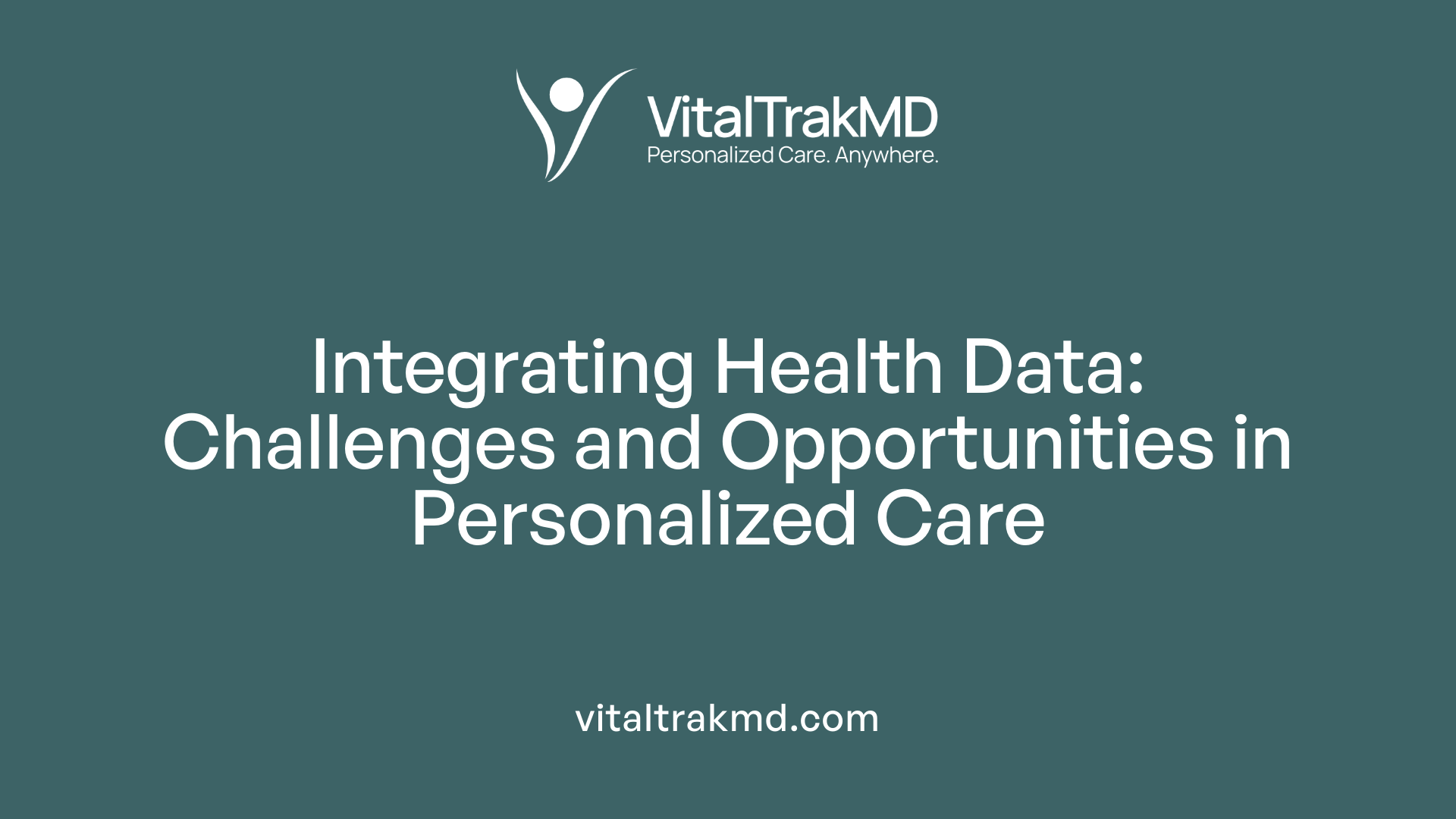
How can compliance and accuracy in testing be ensured?
Maintaining high standards of compliance and accuracy in lab testing is fundamental to reliable health assessments. Selecting reputable laboratories and validated testing devices is crucial. For instance, wearable devices like the Apple Watch or Empatica E4 must meet specific validation criteria to accurately monitor physiological signals associated with stress management.
Regular calibration and quality checks are essential to ensure data integrity. Healthcare providers must stay informed about evolving standards and guidelines, including functional ranges that promote early detection of health imbalances.
Data interpretation should always consider the broader health context—symptoms, lifestyle, and other diagnostics—to prevent misdiagnoses. Employing standardized protocols and integrating lab data with clinical insights minimizes errors and maximizes the benefits of personalized care.
What training and mentorship are needed for providers?
Providers require specialized training to interpret versatile lab results effectively. Understanding the nuances of nutrient markers, hormonal balances, and gut health tests helps tailor interventions appropriately.
Mentorship programs can develop these competencies further, providing real-world case studies and peer support. Upskilling through continuous education allows practitioners to interpret complex data from advanced lab panels, including micronutrient and metabolic profiling.
Additional training in emerging tools, such as wearable technology and lab-quality point-of-care testing like VitaMe's blood tests, equips providers to incorporate new technologies into routine care seamlessly.
How can reputation and partnerships enhance service delivery?
Partnering with established labs, technology providers, and reputable nutritional supplement firms can significantly strengthen service offerings. Trusted alliances ensure access to high-quality testing options via platforms like Fullscript, which consolidates lab orders and streamlines processes.
Building a strong reputation for accuracy and personalized care encourages patient trust and compliance. Collaborations with institutions experienced in implementing integrated health services—combining labs, wearable technology, and behavioral therapy—can foster innovative solutions.
Such partnerships also facilitate sharing best practices, expanding knowledge, and scaling services to broader populations.
| Aspect | Details | Additional Notes |
|---|---|---|
| Testing Compliance | Use validated labs; perform calibration | Ensures accuracy of results |
| Provider Training | Focus on lab interpretation; continuous education | Improves diagnostic confidence |
| Reputable Partnerships | Collaborate with top labs and tech firms | Enhances service quality |
| Technology Utilization | Wearables, point-of-care testing | Supports integrative assessments |
| Data Management | Secure storage; seamless sharing | Facilitates holistic treatment plans |
| Care Quality | Emphasize holistic, personalized approaches | Builds trust and outcomes |
Integrating lab testing with wearable data, personalized counseling, and community partnerships presents an opportunity to revolutionize health management. Overcoming challenges related to compliance, training, and reputation will be crucial to delivering consistent, targeted, and effective care tailored to individual needs.
The Practical Impact of VitalTrak’s Technology on Daily Life
How does VitalTrak’s technology enhance ease of use and patient convenience?
VitalTrak’s innovative health technology is designed with simplicity and user-friendliness at its core. Patients can effortlessly operate portable lab testing devices that analyze critical health markers from a single drop of blood. This convenience is especially beneficial for individuals with busy schedules or those unaffiliated with traditional healthcare settings.
The platform integrates seamlessly with existing telehealth services, enabling patients to perform tests at home without the need for frequent clinic visits. Results are quickly available via connected apps, allowing for rapid interpretation and action.
How does real-time feedback facilitate health adjustments?
VitalTrak emphasizes providing immediate, actionable data. When a patient conducts a test—such as assessing nutrient levels or lipid profiles—the results are processed on the spot. This rapid feedback allows individuals to recognize potential issues early, such as nutrient deficiencies or metabolic imbalances.
Real-time insights enable users and their healthcare providers to make timely modifications to dietary plans, supplement routines, or lifestyle habits. For instance, if a blood test reveals suboptimal nutrient levels, personalized recommendations can be updated instantly, enhancing adherence and effectiveness.
How does VitalTrak empower individuals with their health data?
Empowerment through knowledge is a cornerstone of VitalTrak’s approach. The platform offers intuitive dashboards that visualize health trends over time. Users see how their lifestyle choices influence key markers, fostering a deeper understanding and motivation for healthy habits.
By maintaining a continuous stream of data, individuals can identify patterns, such as fluctuations in lipid levels or signs of nutritional deficiencies. This ongoing monitoring transforms passive health management into active engagement.
Moreover, the data supports personalized coaching and counseling. Healthcare professionals can review detailed reports, identify emerging issues before symptoms appear, and tailor interventions accordingly.
How does VitalTrak integrate lab data with general health management?
VitalTrak’s system not only delivers laboratory-quality results but also connects these insights with broader health data—including wearable device metrics like Heart Rate Variability (HRV) and respiration rate. This integration offers a comprehensive picture of health.
For example, stress management interventions can be more precise when combining lab results with real-time physiological signals gathered by wearables. Such dual insights support targeted techniques like guided breathing exercises or virtual reality therapies.
Incorporating lab tests into daily routines minimizes the gap between clinical assessments and everyday health management, fostering proactive well-being.
Benefits of simplified testing and immediate insights
This approach reduces barriers to regular health monitoring. Patients gain confidence, as they are equipped with dependable, easy-to-use tools that deliver laboratory-grade data at home.
The immediacy of results helps catch potential health issues early, promote preventive behavior, and adjust personalized nutrition and lifestyle plans rapidly.
In summary, VitalTrak’s technology transforms health management from infrequent check-ups into continuous, accessible, and empowering daily practice. It aligns modern biotech innovations with real-world needs, making sophisticated health insights readily available and actionable for everyone.
Conclusion: Pioneering Personalized Wellness
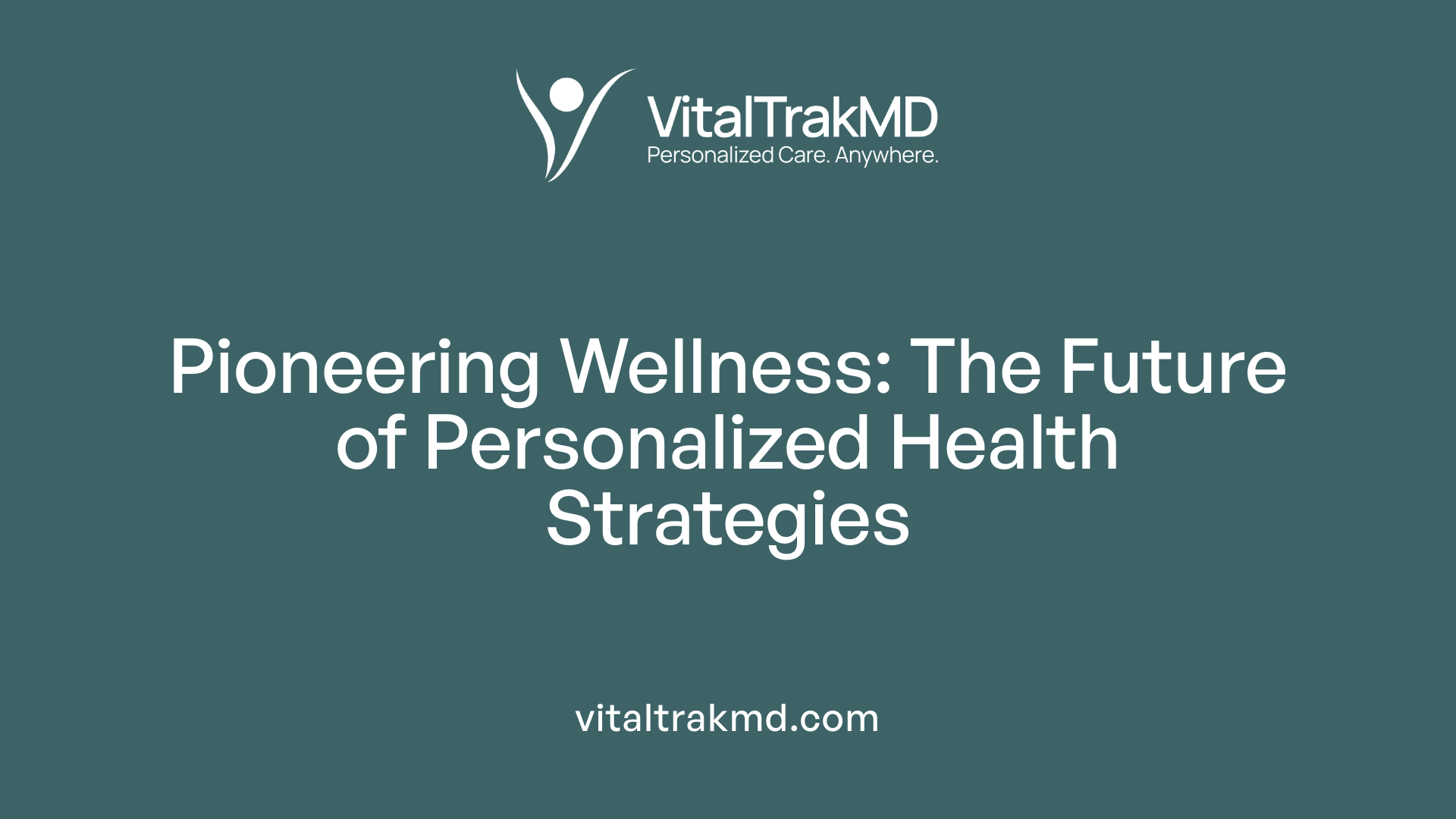
How does VitalTrak’s system utilize lab data to inform personalized nutrition advice?
VitalTrak’s platform leverages comprehensive lab data, including genetic testing via DNA analysis, to build a detailed profile of an individual's health markers. This information covers nutrient metabolism, response to different foods and physical activity, and genetic predispositions. Trained dietitian nutritionists interpret these results accurately, using them to craft tailored nutrition and fitness plans.
Understanding how each person metabolizes proteins, fats, and carbohydrates, as well as their absorption of vitamins and minerals, enables VitalTrak to develop targeted interventions. This personalized approach goes beyond generic diets, offering evidence-based recommendations that suit each person's unique biology.
By integrating lab insights with lifestyle and symptom data, the system maximizes potential health improvements. The outcome is a customized wellness plan that promotes optimal nutrition, supports metabolic health, and helps prevent nutrient deficiencies or imbalances.
Summarizing the integrated approach
The future of health optimization involves combining various advanced tools and data sources. Lab testing, wearable devices, and digital tracking create a comprehensive picture of individual health. This approach allows practitioners to move away from one-size-fits-all solutions toward personalized strategies.
Lab data provides foundational insights, revealing hidden nutrient gaps, hormonal imbalances, and gut health issues. Wearables monitor physiological signals in real-time, helping detect stress and other stressors early on. Continuous data collection enables dynamic adjustments to nutrition and lifestyle plans.
This integrated system promotes proactive health management, early detection of potential problems, and tailored interventions that improve long-term outcomes. It empowers individuals to take control of their wellness journey with scientifically grounded tools.
Future prospects for health tech
The horizon for health technology is bright, with innovations like lab-quality point-of-care tests, AI-driven data analysis, and seamless data sharing platforms. Companies like VitaMe Technologies exemplify this trend, providing lab-grade testing from a simple blood drop and combining it with personalized advice.
Advancements in wearable technology are making stress management, blood pressure monitoring, and fitness tracking more accessible and accurate. Virtual reality and biofeedback tools are expanding self-regulation therapies, making stress reduction and mental health support more effective.
Integration of these technologies promises to create comprehensive health ecosystems where data flows seamlessly between devices, apps, and healthcare professionals. This networked approach will facilitate more precise diagnostics and personalized intervention plans.
The role of science in personalized health
Science underpins all these innovations, offering evidence-based insights that shape personalized care. Clinical studies demonstrate the value of lab testing, wearable sensors, and targeted therapies in improving health outcomes.
Our understanding of physiological signals like HRV, EEG, and galvanic skin response continues to deepen, leading to more sophisticated stress detection and management strategies. The development of functional ranges and predictive analytics allows earlier intervention before clinical symptoms manifest.
As scientific research advances, so will our capacity to tailor health interventions uniquely suited to each individual. This cycle of innovation ensures that personalized wellness remains grounded in reliable, scientific principles, paving the way for a healthier future.
A New Era in Personalized Wellness
Through the seamless integration of advanced lab diagnostics and personalized nutritional counseling, VitalTrak is reshaping health management into a precise, data-driven enterprise. This approach not only enhances the effectiveness of health interventions but also empowers individuals to take control of their wellness journey with confidence. As scientific testing and health technology continue to evolve, VitalTrak’s model exemplifies the future of personalized healthcare—where science and lifestyle merge seamlessly to foster better health outcomes for all.
References
- Lab Testing for Nutritional Counseling | Fullscript
- Wearables for Stress Management: A Scoping Review - PMC
- VitaMe Technologies, Inc. - F6S
- Nutrition Counseling, Lipid Profile Improvement and Weight Loss in ...
- The Best Blood Pressure Monitor for Home Use - The New York Times
- Nutrition Care Process (NCP) - eNCPT
- Nutrition Assessment - eatrightPRO.org
- What Is Medical Nutrition Therapy? - Cleveland Clinic
- A step-by-step guide to nutrition counseling
Recent articles
Want to Feel Better and Live Healthier?
Join hundreds of patients taking control of their health with personalized care that fits their life – not the other way around.
Rated 4.8/5 by 32+ customers







